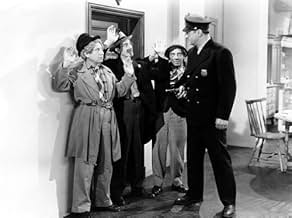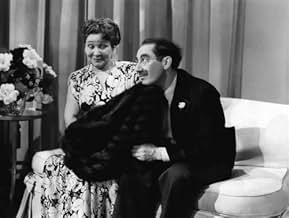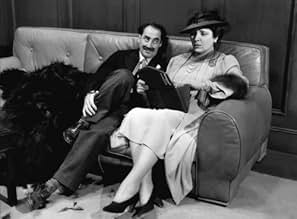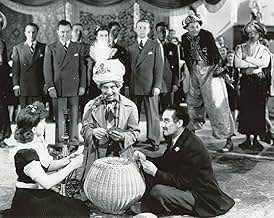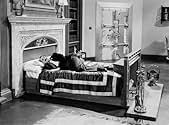VALUTAZIONE IMDb
6,5/10
5638
LA TUA VALUTAZIONE
Aggiungi una trama nella tua linguaA detective is hired to protect the life of a singer who has recently inherited a department store, from the store's crooked manager.A detective is hired to protect the life of a singer who has recently inherited a department store, from the store's crooked manager.A detective is hired to protect the life of a singer who has recently inherited a department store, from the store's crooked manager.
- Regia
- Sceneggiatura
- Star
King Baggot
- Store Employee
- (non citato nei titoli originali)
Marvin Bailey
- Member - Six Hits and a Miss
- (non citato nei titoli originali)
Recensioni in evidenza
Same old note: The Marx Brothers INGENIOUSLY twist any phrase or object into HILARITY.
Unfortunately, this film has a plot.
The usual hilarity when The Marx Brothers are left to their own devices, but too much screen time not dedicated to The Marx Brothers.
NOTE: If you have a heart-beat and love to laugh yourself silly, you MUST see Horse Feathers, Duck Soup, The Coconuts and Monkey Business.
Unfortunately, this film has a plot.
The usual hilarity when The Marx Brothers are left to their own devices, but too much screen time not dedicated to The Marx Brothers.
NOTE: If you have a heart-beat and love to laugh yourself silly, you MUST see Horse Feathers, Duck Soup, The Coconuts and Monkey Business.
By 1941, Groucho didn't want to make any more movies. The Brothers continued to do so just to keep oldest Brother Chico afloat, due to his gambling habits.
Someone commented earlier about Virginia O'Brien, the deadpan singer in the "rockabye" sequence. The deadpan delivery was her "shtick", and predated a similar approach taken by Keely Smith some years later. Legend has it that the first time a spotlight fell on Ms. O'Brien for an on-stage solo, she froze, an delivered her song with a pre-Botox facial paralysis. The audience thought it was part of the act and roared approvingly with laughter. From then on, Ms. O'Brien sang no other way. (She also sings a few bars of the Jerome Kern song, "A Fine Romance" in the semi-bio, "'Til The Clouds Roll By".) The big store is best remembered (and viewed) for the rousing "Sing While You Sell" piece about 38 minutes into the movie.
Someone commented earlier about Virginia O'Brien, the deadpan singer in the "rockabye" sequence. The deadpan delivery was her "shtick", and predated a similar approach taken by Keely Smith some years later. Legend has it that the first time a spotlight fell on Ms. O'Brien for an on-stage solo, she froze, an delivered her song with a pre-Botox facial paralysis. The audience thought it was part of the act and roared approvingly with laughter. From then on, Ms. O'Brien sang no other way. (She also sings a few bars of the Jerome Kern song, "A Fine Romance" in the semi-bio, "'Til The Clouds Roll By".) The big store is best remembered (and viewed) for the rousing "Sing While You Sell" piece about 38 minutes into the movie.
When crooner Tommy (Tony Martin) inherits his father's lucrative department store, he hopes to sell it to open a music conservatory for disadvantaged boys. Shady store manager Mr. Grover (Douglass Dumbrille) has been embezzling from the place, so he tries to have Tommy killed before the deal can take place and reveal Grover's malfeasance. Tommy's aunt Martha (Margaret Dumont) hires private detective Wolf J. Flywheel (Groucho Marx) to be Tommy's bodyguard, and along with Flywheel's assistant Wacky (Harpo Marx) and Tommy's pal Ravelli (Chico Marx) they get into all sorts of trouble in the department store.
The Marx Brothers declared that this would be their last film together, and I can see why they wanted to give it up after this substandard outing. The jokes fall flat, and too much time is spent on other characters and Tony Martin's singing numbers. It's not a complete bust, and there are a few chuckles scattered about like rare gems. Groucho's scenes with Dumont are still funny. The Brothers eventually made a couple more together as finances necessitated it, but they never matched their early 30's heyday.
The Marx Brothers declared that this would be their last film together, and I can see why they wanted to give it up after this substandard outing. The jokes fall flat, and too much time is spent on other characters and Tony Martin's singing numbers. It's not a complete bust, and there are a few chuckles scattered about like rare gems. Groucho's scenes with Dumont are still funny. The Brothers eventually made a couple more together as finances necessitated it, but they never matched their early 30's heyday.
Well, folks, this is the final nail in the coffin. This film marks the final collaboration between the World's Greatest Comedy Team and MGM studios - and it's a pretty sad epitaph. It's not the Marxes' fault - 'twas MGM that slew the boys (they also successfully neutered Laurel & Hardy, the b*******!). They relegated one writer to this and their two previous films, rather than a team of scribes and refused to let them try their material out live. Plus, it's clear the studio really didn't have a firm grasp on their characters: in this film, "At the Circus," and "Go West," they allow Groucho, Harpo, and Chico to become victimized. This would be unheard of during the Paramount years. Even when misfortune falls on the three in "A Night at the Opera" and "A Day At the Races," they come back even stronger, making their foes wish they'd never been born. The Marx Brothers aren't supposed to take s**t from anybody! Well, there's still a few good moments (the opening sequence of Groucho and Harpo trying to impress Margaret Dumont in their run-down detective office) but many of the scenes are pale retreads of great bits from earlier films (plus, it has the most repellent musical number ever featured in a Marx movie - "The Tenement Symphony"... yow! What a big, brown floater that is!). But, hey, even marginal Marx Brothers is better than most anything else I can imagine. If you've never experienced the Fab Four-then-Three before, don't start here - try "Duck Soup," "Horse Feathers," or "Monkey Business."
When people are asked which is their least favorite Marx Brothers movie, "The Big Store" is one of the most frequent choices. And it's not hard to understand why: this must be the Marx movie with the least comedy content in it - if not in quality, then certainly in quantity. Apart from the hilarious scene near the start where Margaret Dumont tries to explain the case "in detail" to supposedly busy detective Groucho while Harpo is typing loudly and a toaster goes out of control (a sequence that can make you laugh no matter how many times you see it), it's hard to name another classic piece of comedy here. The scene with the 14-member Italian family and the climactic chase inside the store are more chaotic and frenetic than funny (and there's also way too much fast motion used). On the bright side, this film has a better supporting cast than "Go West", "Sing While You Sell" is a grand and catchy number, Harpo and Chico have a delightful piano duet and Harpo's harp-playing scene is pure magic. While in many Marx Brothers movies I find the piano and harp numbers a dull interruption of the comedy, in "The Big Store" they are a welcome relief from the absence of comedy! **1/2 out of 4.
Lo sapevi?
- QuizSeventh and final film teaming of The Marx Brothers with Margaret Dumont.
- BlooperObvious doubles for the main characters during the finale chase sequence (except for close-ups).
- Citazioni
Mr. Grover: What experience have you had at a department store?
Wolf J. Flywheel: I was a shoplifter for three years.
- ConnessioniFeatured in Classic Comedy Teams (1986)
- Colonne sonoreTenement Symphony
(1941)
Music by Hal Borne
Lyrics by Sid Kuller and Ray Golden
Sung by Tony Martin (uncredited) and St. Luke's Episcopal Church Choristers (uncredited),
with Chico Marx (uncredited) and Harpo Marx (uncredited)
I più visti
Accedi per valutare e creare un elenco di titoli salvati per ottenere consigli personalizzati
- How long is The Big Store?Powered by Alexa
Dettagli
- Tempo di esecuzione1 ora 23 minuti
- Colore
- Proporzioni
- 1.37 : 1
Contribuisci a questa pagina
Suggerisci una modifica o aggiungi i contenuti mancanti

Divario superiore
By what name was Il Bazar delle follie (1941) officially released in India in English?
Rispondi

